The heart health category has seen tremendous scientific work performed, laying the foundation for successful sales. Here, we spotlight select heart-health products along with some of the most compelling research behind them as supplied by our sources. Many companies mentioned have numerous heart health-specific products, but space precludes mentioning all of them. Retailers should contact their manufacturers for information on all their products and available science.
Omega-3s
One of the most notable subcategories that has garnered household-name status is omega-3 essential fatty acids (EFAs). “The most significant growth in both the category and in the research surrounding heart disease in the last five years has definitely been with omega-3 fatty acids,” states Marci Clow, MS, RD, senior director of product research at Rainbow Light Nutritional Systems, Santa Cruz, CA.
Stuart Tomc, national educator for Nordic Naturals, Watsonville, CA, says EFA formulas in a 4:1 ratio of EPA: DHA are “recommended by physicians to enable their patients who suffer from heart health issues to easily get the American Heart Association’s recommended one to three grams (1,000–3,000 mg) of the specific omega-3s EPA and DHA each and every day.”
Other experts also note another important recent trend: the medical establishment and the U.S. Food and Drug Administration (FDA) are acknowledging the value of sources of omega-3 fatty acids for the prevention of cardiovascular events. Observes Herb Joiner-Bey, ND, medical science consultant for Barlean’s Organic Oils, Ferndale, WA, “Forty years of clinical and population studies had generated such a large mountain of convincing evidence that it could not be ignored or cavalierly dismissed. This recognition has put omega-3 fatty acid products—flaxseed oil and fish oil—into the forefront of consumer demand and retail sales as this understanding is grasped by larger numbers of people.”
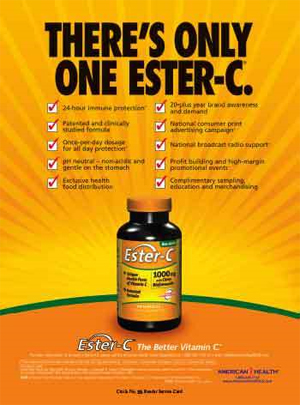 Such recommendations come for good reasons. Omega-3s help prevent blood platelets from clumping together, thereby reducing the risk of blood clot formation that may cause a heart attack. “The omega-3s also ease strain on the heart and reduce the risk for angina (chest pain) by, among other things, reducing high blood pressure, keeping arteries flexible (omegas control inflammation within artery walls), lowering LDL cholesterol and triglycerides (blood fats), and possibly even raising HDL cholesterol,” says Clow.
Such recommendations come for good reasons. Omega-3s help prevent blood platelets from clumping together, thereby reducing the risk of blood clot formation that may cause a heart attack. “The omega-3s also ease strain on the heart and reduce the risk for angina (chest pain) by, among other things, reducing high blood pressure, keeping arteries flexible (omegas control inflammation within artery walls), lowering LDL cholesterol and triglycerides (blood fats), and possibly even raising HDL cholesterol,” says Clow.
Tomc points to one study that suggests omega-3 in modest doses reduces cardiac deaths and reduces nonfatal cardiovascular events in high doses (1).
Consumers have numerous options for how to get their omega-3s. Specifically, flaxseed oil and supplements are said to benefit heart health and lower cholesterol levels (as well as help increase energy levels and promote healthier immune and digestive systems). According to information provided by Barlean’s, flaxseed oil provides high amounts of alpha-linolenic acid (ALA), which research has shown can reduce risk of fatal heart attack and may reduce tendency for blood clotting. Part of the reason why may be that chronic inflammation can be a major contributing factor to the development of atherosclerosis and undesirable blood clotting. ALA reduces biomarkers (C-reactive protein) indicative of inflammation in progress. The concentration of ALA in fat tissue is associated with blood pressure. As fat tissue ALA increases, elevated blood pressure decreases.
And, fish oil has been studied for cardiovascular support. According to authors Marcia Zimmerman and Jayson Kroner, “Those who consume fatty fish or supplement with omega-3 tend to have noticeably lower blood pressure and LDL cholesterol levels than those who don’t consume DHA and EPA on a regular basis” (2).
The field isn’t limited to just fish and flax oils. Extra-virgin olive oil is popular for cardiovascular benefits and protection against heart disease by regulating cholesterol levels, says Mary Ann Siciliano, national sales manager of Arista Industries, Wilton, CT. She notes the following oils also have heart health benefits: rice bran (supports cholesterol levels), canola (high in mono-unsaturates), pomegranate (said to reduce heart disease risk and help control high blood pressure), safflower oil (helps prevent coronary artery disease and lower cholesterol), sesame oil (helps eliminate cholesterol) and sunflower oil (helps lower cholesterol and heart disease risk).
Select Company Offerings: Nordic Naturals offers Omega LDL, EPA Xtra and many other fish oil formulas. Arista Industries offers oils and fats for use in supplements and functional foods. Barlean’s Organic Oils makes Barlean’s Organic Flaxseed Oil, Total Omega and Omega Swirl Flax Oil. J.R. Carlson Laboratories offers high-quality fish oil formulas. Rainbow Light Nutritional Systems makes Everyone’s Omega Fish and Flax.
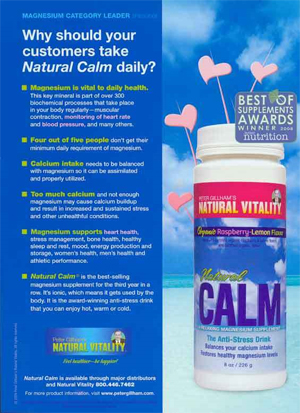 Vitamin E
Vitamin E
Vitamin E is a key for heart health because it is said to inhibit the oxidation of LDL cholesterol (2). Several large studies found that taking vitamin E can lower the risk of coronary heart disease (2).
For example, Jolie M. Root, LNC, LPN, a nutrition educator at JR Carlson Laboratories, Arlington Heights, IL, cites one of the largest such studies, which found vitamin E supplementation significantly reduced the number of heart disease-related deaths over a 10-year period in healthy women. Some 39,876 women over the age of 45 took either a vitamin E supplement (600 IU alpha tocopherol) or a placebo every other day. About 24% fewer deaths due to heart disease were reported in the women ages 45–64 receiving vitamin E than in those receiving the placebo. In those older than 65, and therefore at the most risk for cardiovascular death, a 49% reduction in deaths due to heart disease was found (3).
The same study noted that vitamin E reduced the risk of dangerous blood clots by as much as 49%. Researchers found that women who took vitamin E had a 21% less risk of developing blood clots as opposed to women not taking the supplement. In women with a history of blood clots, the risk reduction while supplementing with vitamin E jumped to 44%. And in those with a genetic mutation that increased their risks of developing blood clots, vitamin E supplementation caused a 49% risk reduction (4).
Select Company Offerings: Providers of high-quality vitamin E supplements include J.R. Carlson Laboratories and A.C. Grace Company (maker of Unique E).
Vitamin K2
Recent research has noted “a significant role” for vitamin K2 in combating the “the silent killer, atherosclerosis or hardening of the arteries,” explains Eric Anderson, brand manager for PL Thomas, Morristown, NJ. Anderson puts the situation in context: “The medical community used to think that calcium accumulation in the arteries (causing them to lose elasticity and harden) was a by-product of aging and cardiovascular disease. Today, we know that this is an actively controlled process, regulated by the vitamin K-dependent protein MGP. With inadequate vitamin K in the diet, and especially the form of vitamin K2, MGP is not effective and does not recycle the calcium out of the artery walls—thus allowing calcification to occur. Laboratory, animal and human studies have shown vitamin K2 intake can inhibit, and potentially even regress, calcifications of the arteries.”
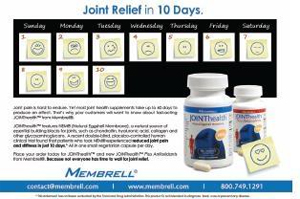 In the Rotterdam study, which followed 4,807 healthy adults over a 10-year period, high consumption of natural vitamin K2 (45 mcg per day) resulted in 50% less calcification in the arteries and 50% reduced risk of coronary heart disease-related death compared with the lowest consumption. Interestingly, vitamin K1 had no correlation (5). Similar findings were seen in a cross-sectional study among 564 post-menopausal women to investigate the association of phylloquinone (K1) and menaquinone (K2) intake with coronary calcification. Based on study results, scientists found that high dietary K2 intake was related to reduced coronary calcification, whereas—again—the amount of consumed phylloquinone (K1) was of no significance for human vascular health (6).
In the Rotterdam study, which followed 4,807 healthy adults over a 10-year period, high consumption of natural vitamin K2 (45 mcg per day) resulted in 50% less calcification in the arteries and 50% reduced risk of coronary heart disease-related death compared with the lowest consumption. Interestingly, vitamin K1 had no correlation (5). Similar findings were seen in a cross-sectional study among 564 post-menopausal women to investigate the association of phylloquinone (K1) and menaquinone (K2) intake with coronary calcification. Based on study results, scientists found that high dietary K2 intake was related to reduced coronary calcification, whereas—again—the amount of consumed phylloquinone (K1) was of no significance for human vascular health (6).
For more on this important topic, see this month’s Vitamin Connection column on page 70.
Select Company Offerings: PL Thomas is the supplier of MenaQ7 vitamin K2. NOW Foods offers vitamin K2 supplements.
Coenzyme Q10 (CoQ10)
CoQ10 is a powerful antioxidant that spurs the production of adenosine triphosphate (ATP). This molcule provides the “spark” that is used in the heart for contraction, relaxation and molecular synthesis (2). The heart cannot function properly without an adequate supply of CoQ10, as decreased levels of CoQ10 can impair ATP synthesis. “Since CoQ10 is so crucial in the energy metabolism process, the heart tissues of these patients may not be able to synthesize nearly enough ATP to meet their energy demands,” says Robert Barry, Ph.D., scientific affairs, research and new product development of Kaneka Nutrients, Pasadena, TX. (7)
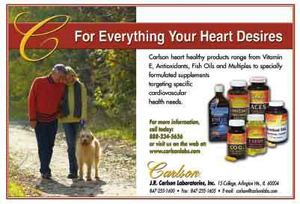 Studies show that supplementation with CoQ10 can “improve clinical outcomes in a number of cardiovascular diseases,” says Barry (7). Research-supported benefits include improvements in conditions such as congestive heart failure, cardiomyopathy and hypertension. In addition, the supplement may “prevent the cholesterol oxidation that often leads to plaque buildup in the arteries” and help “improve the quality of heart cells and blood vessels, while producing the energy needed for more rhythmical contractions and health blood pressure” (2).
Studies show that supplementation with CoQ10 can “improve clinical outcomes in a number of cardiovascular diseases,” says Barry (7). Research-supported benefits include improvements in conditions such as congestive heart failure, cardiomyopathy and hypertension. In addition, the supplement may “prevent the cholesterol oxidation that often leads to plaque buildup in the arteries” and help “improve the quality of heart cells and blood vessels, while producing the energy needed for more rhythmical contractions and health blood pressure” (2).
Select Company Offerings: Jarrow Formulas offers Q-absorb (increases CoQ10 levels up to 400% over baseline [8, 9]), QH-absorb (enhanced stability ubiquinol formula), and Q-absorb Plus (a CoQ10 formula that includes vitamin K2, in the form of MK7 and omega-3 EPA). Kaneka Nutrients offers Kaneka Q10 CoQ10 and Kaneka QH ubiquinol. Solgar Vitamin and Herb makes CoQ10. Soft Gel Technologies offers LyCoQ, CarnisolQ10, CoQsol, CoQsol-CF and CoQH-CF.
Ribose and Carnitine
Ribose and carnitine are also important for supporting ATP. “Present in every cell of the body, ribose is the fundamental building block of ATP,” says Richard Passwater, Ph.D., chief scientific advisor to Solgar Vitamin and Herb, Leonia, NJ. Unfortunately, most lack the metabolic machinery to do so quickly. Therefore, ribose supplementation may be important. Says Passwater, “ATP levels in the heart and exercising muscles must be consistently replenished, so it is important to maintain the proper levels of ribose for adequate energy support,” explains Passwater. Research has shown D-Ribose’s positive effects on heart support, muscle support and tissue energy synthesis.
Also key for energy and a healthy heart are carnitines, which “transport fatty acids across the mitochondria where they are used in the production of ATP, the chief compound for energy storage in the body,” Passwater says. “Propionyl-L-carnitine (PLC) is a form of L-carnitine that is more readily absorbed into the heart’s muscle tissue where it supports energy metabolism. Research suggests that PLC has positive effects on energy and cardiovascular health.”
Select Company Offerings: Solgar Vitamin and Herb makes Chewable D-Ribose Wafers and gPLC Tablets. Bioenergy is a specialist in ribose. Lonza offers Carnipure (a special grade of l-carnitine).
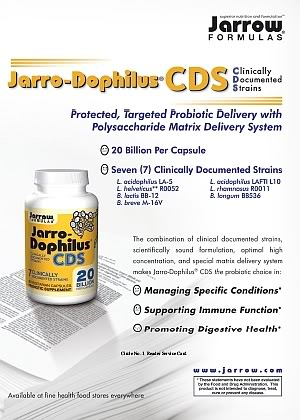 Plant-Based, Herbal Supplements
Plant-Based, Herbal Supplements
Many plant-derived supplements are said to be of use for cholesterol health and blood pressure management. For example, considerable research supports the beneficial effects of grape seed extract on maintaining healthy blood pressure, says Neil E. Levin, CCN, DANLA, nutrition education manager at NOW Foods, Bloomingdale, IL. However, he points out that his substance is normally poorly absorbed due to its poor solubility. “NOW has overcome that problem with a uniquely soluble form of GSE,” he says. “The addition of hawthorn leaf and flower extract as a synergistic natural base is a very nice touch, as someone taking only three caps per day of this formula will also get the form and potency of hawthorn that is recommended in the Kommission E monograph along with a generous amount of soluble GSE,” he explains.
Hawthorn, says Eileen Sheets, managing director of Bioforce USA, Ghent, NY, has been used for decades as a cardiovascular tonic, as it has been shown to improve the efficiency of the heart’s pumping action by increasing blood flow in the coronary arteries. And, improvement in the heart’s ability to pump blood more effectively has a positive effect on blood pressure. “The main constituents in hawthorn that have been identified are flavonoids, which are primarily responsible for the vasodilating effect on the coronary circulation thereby increasing blood flow to the heart, and glycosides, which increase the tone of the heart improving the force of the contraction while reducing the rate of contraction.” A published study showed that crateagus was helped patients with congestive heart failure (10).
On the topic of other heart-helpful herbs, David Winston, founder of Herbalist & Alchemist, Washington, NJ, says blueberry, elderberry and tomato/carrot extracts are all very powerful anti-inflammatories: “Including these in the diet on a regular basis may not only help to inhibit bad cholesterol production, but also when combined with other botanical extracts such as the phenomenal antioxidant turmeric, have been shown to help inhibit atherosclerosis and may even help to treat mild to moderate cases of atherosclerosis. We know that much of cardiovascular disease is related to inflammatory processes and these supplements may be able to do things like reduce C-reactive protein, which is an inflammatory marker.”
Other supplements include garlic (to help prevent the synthesis of cholesterol), resveratrol (benefits cardiovascular system), policosanol (to help lower cholesterol) and French maritime pine bark extract (helps lower blood pressure and improves blood flow). Red yeast rice helps reduce adverse cardiac events also as much as statins (1).
Select Company Offerings: Natural Health Science offers Pycnogenol; NOW Foods makes NOW Beta Sitosterol Plant Sterols with CardioAid Blood Pressure Health and a Hawthorn Extract in Vcaps. Bluebonnet Nutrition makes Heart Antioxidant Formula Vcap and CholesteRice Red Yeast Rice Complex Vcaps. Herbalist & Alchemists offers solid extracts, Cardio Compound and Healthy Heart Compound. Himalaya Herbal Healthcare makes HeartCare, Arjuna and Guggul. Organix South’s TheraVeda Heart and Cholesterol Support. Bioforce USA offers Cardiaforce Heart Drops (hawthorn berry extract).
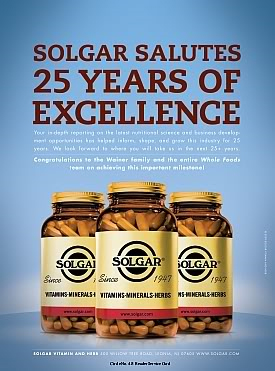 Minerals
Minerals
Rounding out the heart health category are several important minerals. First, chromium may positively affect cholesterol levels. In a double-blind placebo-controlled study, 40 subjects with high cholesterol took 200 mcg of a patented niacin-bound chromium (ChromeMate from InterHealth Nutraceuticals) or a placebo twice a day for two months. The supplement reduced cholesterol by 10% and LDL cholesterol by 14% compared with the placebo (11).
In a separate study involving 34 male athletes, study data showed that supplementation with 200 mcg of niacin-bound chromium (ChromeMate) significantly lowered cholesterol levels by about 14% and improved total cholesterol:HDL cholesterol ratios by 7% (12). In an animal study sponsored by the National Institutes of Health, this branded chromium ingredient reduced triglyceride and cholesterol levels by 52% and 26%, respectively, compared with the untreated group. Chromium picolinate was also tested and showed no significant decrease in these biomarkers (13).
In addition, chromium may be beneficial for modifying blood pressure levels through its effects on the renin-angiotensin system (RAS), a hormone system that regulates long-term blood pressure. A team of researchers, led by Nicholas Perricone, found that niacin-bound chromium (ChromeMate) lowered sugar-induced blood pressure, at least in part, by decreasing RAS activity. The study first confirmed that disturbances in the RAS were significant factors in the elevation of sugar-induced blood pressure, as measured by increased levels of the hormone angiotensin-2. Animals that ingested ChromeMate experienced a significant decrease in angiotensin-2 levels and blood pressure, thus demonstrating one way that the ingredient works to promote healthy blood pressure levels (14).
In terms of other minerals, magnesium has an important direct and indirect effect on blood pressure by relaxing and dilating blood vessels. Indirectly, normal magnesium levels are necessary for keeping in balance electrolytes (sodium, potassium, magnesium and calcium) that are important for normal blood pressure. Low potassium by itself can cause high blood pressure. But even adequate potassium intake cannot normalize high blood pressure if magnesium is too low. Additionally, low magnesium causes a low potassium state, even if potassium intake is adequate. If magnesium is adequate, extra potassium can normalize high blood pressure.
Select Company Offerings: Peter Gillham’s Natural Vitality offers Natural Calm in original and flavored versions. InterHealth Nutraceuticals supplies ChromeMate chromium. Other high-quality mineral supplement suppliers include Trace Minerals Research and Mineral Resources International. WF
References
- H.T. Ong and J.S. Cheah, “Statin Alternatives or Just Placebo: An Objective Review of Omega-3, Red Yeast Rice and Garlic in Cardiovascular Therapeutics,” Chin Med J (Engl). 121 (16), 1588–1594 (2008).
- M. Zimmerman and J. Kroner, 7-Syndrom Healing (Nutrition Solutions Publications, Chino, CA, 2006).
- S. Devaraj et al., “Alpha Tocopherol Supplementation Decreases Serum C-Reactive Protein and Monocyte Interleukin-6 Levels in Normal Volunteers and Type 2 Diabetic Patients,” Free Rad. Bio. Med. 29 (8): 790–792 (2000).
- R. Glynn, et al., “Effects of Random Allocation to Vitamin E Supplementation on the Occurrence of Venous Thromboembolism: Report From the Women’s Health Study.” Circulation, 116, 1497–1503 (2007).
- J.M. Geleijnse, et al., “Dietary Intake of Menaquinone Is Associated with a Reduced Risk of Coronary Heart Disease: The Rotterdam Study,” Nutr. Epid. 134: 3100–3105 (2004).
- J.W.J. Beulens, et al., “High Dietary Menaquinone Intake Is Associated with Reduced Coronary Calcification,” Atherosclerosis, doi:10.1016/j.atherosclerosis.2008.07.010 (2008).
- R. Barry, The Power of Kaneka QH (Health Point Press, Sherman Oaks, CA, 2008).
- R. Belardinelli, et al., Eur Heart J. 27, 2675–2681 (2003).
- R. Belardinelli, et al., American Heart Association Supplement to Circulation. 108 (17), 739 (2003).
- F.H. Dengenring, et al., “A Randomised Double Blind Placebo Controlled Clinical Trial of a Standardised Extract of Fresh Crataegus Berries (Crataegisan) in the Treatment of Patients with Congestive Heart Failure NYHA II,” Phytomedicine 10: 363–369 (2003).
- H.G. Preuss, et al., “Effects of Niacin-Bound Chromium and Grape Seed Proanthocyanidin Extract on the Lipid Profile of Hypercholesterolemic Subjects: A Pilot Study,” J. Med. 31, 227–246 (2000).
- R.G. Lefavi, et al., “Lipid-Lowering Effect of a Dietary Chromium (III)-Nicotinic Acid Complex in Male Athletes,” Nutr. Res. 13, 239–249 (1993).
- S.K. Jain et al., “Effect of Chromium Niacinate and Chromium Picolinate Supplementation on Lipid Peroxidation, TNF-·, IL-6, CRP, Glycated Hemoglobin, Triglycerides, and Cholesterol Levels in Blood of Streptozotocin-Treated Diabetic Rats,” Free Rad. Bio. Med. 43, 1124–1131 (2007).
- N.V. Perricone, et al., “Blood Pressure Lowering Effects of Niacin-Bound Chromium (III) (NBC) in Sucrose-Fed Rats: Renin-Angiotensin System,” J. Inorg. Biochem. 102, 1541–1548 (2008).
Lisa Schofield is a freelance writer based in Freehold, NJ.
Published in WholeFoods Magazine, February 2009









